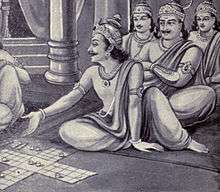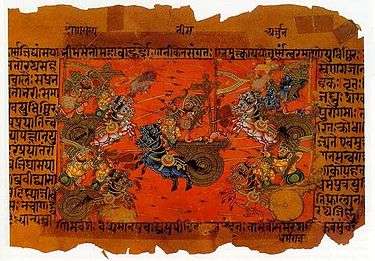Shakuni
| Shakuni | |
|---|---|
| Predecessor | Subala |
| Children | Uluka and Vrikaasur |
| Parent(s) |
Subala (father) Sudarma (mother) |
| Relatives | Gandhari (sister) |
Shakuni (Sanskrit: शकुनि, lit. bird) also known as Saubala (Sanskrit: सौबल, lit. son of Subala) ,Gandhararaja (Sanskrit: गान्धारराज, lit. king of Gandhara)and Subalraja(Sanskrit): सुबलराज,lit. "King of the Kingdom of Subala" was the prince of Gandhara Kingdom in present-day Gandhara, later to become the King after his father's death and one of the main villains in the Hindu epic Mahabharata. He was the brother of Gandhari and hence Duryodhana's maternal uncle. Portrayed as an extremely intelligent but devious man, Shakuni is often credited as the mastermind behind the Mahabharata war. Shakuni had two sons named Uluka and Vrikaasur (Bhasmasura).
It is believed that Shakuni was the personification of Dvapara Yuga.
Early days
Shakuni was born in Gandhara in modern-day Afghanistan to King Subala. He was a great devotee of Lord Shiva.
It is said that in a military campaign by either Bhishma, Pandu, or Shantanu, Gandhara came under attack from Hastinapur. Hastinapur conquered Gandhar, killed the king Achala Suvala, and imprisoned all the male members of his line, saying that line was full of adharma. This included Shakuni and his 100 brothers. Since all of them were sparsely fed (with one grain of rice each per day) in the prison, the family decided that at least one of them could survive and gave all the rice to Shakuni, the most cunning of them all, so that he could live on to take revenge. Eventually, King Subala, bends the knee to make a permanent mark of the injustice. Considered a man of dharma, his family is allowed to live.
Shakuni was unhappy with his sister Gandhari's marriage to Kaurava prince Dhritarashtra. He was especially angry with Bhishma for bringing this proposal as he found it insulting and demeaning, not only because Dhritarashtra was blind, but also because the Kurus had destroyed his line years before. He swore to avenge this insult by slowly destroying Bhishma's clan. He achieved this by poisoning the mind of his volatile nephew Duryodhana into instigating the war with the Pandavas, which destroyed the Kuru line. Thus, he is seen by many as one of the key persons that caused the Kurukshetra War.
Some popular versions of this story focus on Shakuni's anger over Hastinapur. But that version is not present in the original Mahabharata and is found mostly in modern versions of the epic. Likewise, some versions of the story describe Shakuni using the bones of his dead parents to create dice that will never lose him a game, as Shakuni's father's soul enters the dice to make it roll to whatever number Shakuni wanted.
Role in the Mahabharata

Shakuni is perhaps best known for masterminding the infamous Game of Dice between the Kauravas and the Pandavas. A master of sorcery, Shakuni had his blessed dice which would always follow his will. Unaware of this fact, the Pandavas were defeated in the gambling match. Shakuni encourages Duryodhana, Dushasana, Karna, and the others when they taunt and humiliate the Pandavas.
Shakuni is also one of the masterminds behind the Kurukshetra War. His intentions include his desires a) to avenge the defeat of Gandhara by Hastinapur years before, b) to avenge the insult Bhishma made when he insisted on Gandhari's marriage to blind man, and to see his own blood (the Kauravas), his sister's children, elevated over the Pandavas.
He mainly worked by inciting hatred between the Kauravas and Pandavas; his plans culminated in the biggest wars in Indian history. Although he was very often not successful, he never lost his faith in his ability to destroy the lineage of Kuru. The story mentions that Shakuni, by staying at Hastinapur, is neglecting his duties as king in Ghandar; Shakuni explains to Uluka that his desire for revenge overruns his concern for Gandhar's people.
Ways in which Shakuni incited war include:
- Advising an adolescent Duryodhana to mix poison into Bhima's food.
- Hiring Purochana to kill the Pandavas in the Palace of lac.
- Before the war he advised Duryodhana to feed Shalya's army and make Shalya his indebt, making it compulsory for him to fight on the side of Kauravas
- During the Kurukshetra war he abetted in the killing of Arjuna's son Abhimanyu by cheating and breaking the war protocol.
Shakuni's only saving grace is his extreme love towards his sister Gandhari. Her act of voluntarily blindfolding herself does not go down too well with Shakuni, who constantly advises her to take off her blindfold and see Bhishma's destruction, but she refuses. Time and time again, he expresses the anger he felt for the injustice that Gandhari had to go through by leading her entire life with a blindfold.
Death
After the Game of Dice episode in the Mahabharata, the youngest of the[1] Pandava brothers Sahadeva had taken an oath to revenge Draupadi's insult and sworn to kill Shakuni, the mastermind of the episode. As sworn, Shakuni was killed by Sahadeva on the eighteenth day of the Kurukshetra war.
Descendants
Ambhi Kumar, king of Gandhara was a direct descendant of Bharata (of Ramayana) and Shakuni (of Mahabharata). Ambhi Kumar and Chandragupta Maurya took training and studied together at Takshila in childhood. In 326 BCE Alexander the Great receives submission of ruler of Takshila, Omphis (Āmbhi). Later Ambhi was deposed and killed by Chandragupta Maurya, the emperor of the Mauryan Empire.
Worship

Even though Shakuni's name is associated with villainy, Hinduism sees a person in terms of Gunas. It is true that Tamasic characteristics were dominant in Shakuni but he too had Sattvic elements and this was recognized by a community in Kerala. There is an ancient temple dedicated to him at Pavithreswaram in Kollam District of Kerala. A throne believed to have been used by Shakuni is found in this ancient temple. No Puja or tantric rituals are performed at the temple. Offerings to the temple include tender coconut, silk, Palm wine, etc. The temple is maintained by the Kuravar community of the region.
It is believed that during the Mahabharata battle, Shakuni traveled across the country along with his nephews, the Kauravas. When they reached the place where the temple is situated, the Kauravas divided their weapons among them. Since then, the place came to be known as 'Pakutheswaram', which later became Pavithreswaram. The local Kuravars believe that Shakuni returned to this place after the battle and attained Moksha with the blessings of Lord Shiva and became Lord Shakuni. The subdeities of the temple include Devi Bhuvaneshvari, Kiratha Moorthi and Nagaraja. The temple festival, popularly known as Malakkuda Maholsavam, is observed in the Makaram month in the Malayali calendar. Near the Shakuni Temple is a temple dedicated to Duryodhana. The Mahabharata mentions Shakuni as the personification of Dwapar Yuga and Duryodhana as his constant companion Kali (Mbh.15.31)
References
Further reading
- Dutt, Romesh. "Maha-Bharata, The Epic of Ancient India".
- Dwaipayana, Vyasa. "The Mahabharata of Krishna".
- Ganguly, Kisari. "The Mahabharata of Krishna-Dwaipayana Vyasa".
- Menon, Ramesh. A Modern Rendering, The Mahabharata.
- The Story of Shakuni, Sribd.
- Was Shakuni Mama’s character in Mahabharat a negative character?, Destination Infinity.
- The Mahabharata: A Synopsis of the Great Epic of India, R. Vemuri, UC Davis.
- Mahabharat, Swargarohan.
- Mahabharata (Veda Vyasa), Hindu Online.


